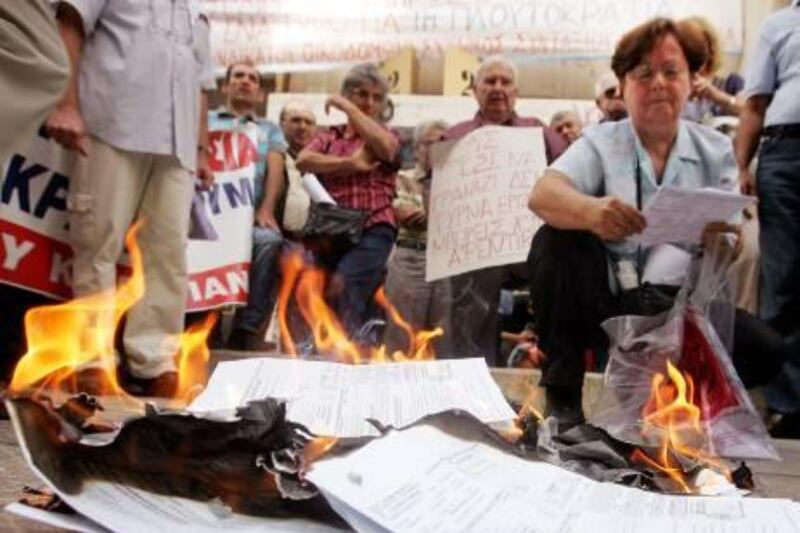Protesters took to the streets of the Greek capital yesterday as European and IMF officials arrived to decide the country's financial fate and Germany passed a measure to beef up the continent's bailout fund.
Yesterday's vote for a stronger European Financial Stability Fund (EFSF) by Germany's lower house was expected, but observers were watching for signs of dissent within Angela Merkel's centre-right Christian Democratic Union coalition. That did not materialise, however, with 523 votes in favour of the bill and 85 against.
The decision was greeted with a rare expression of relief in Athens. "It's a very positive move as we all know it's not only Greece that has problems," said Elias Spirtounias, the executive director of the American-Hellenic Chamber of Commerce in Athens.
"If we compare the numbers, we are 2 to 3 per cent of Europe's GDP and our debt is about 5 per cent of that total. Of course there's a domino effect, but Europe has to stand together and get a real sense of this problem."
Stock markets in Europe traded more than 1 per cent higher following the announcement. While many investors viewed Germany's commitment to financial stability and cohesion in Europe as a positive, a number of other factors weighed negatively.
Public-sector workers occupied government buildings in Athens in protest at the toll Greek austerity is taking. Employees staged takeovers or sit-ins at various ministries and other government offices.
Elsewhere in the city, actors, musicians and students shouted through megaphones and held up banners announcing their plight as they made their way to Syntagma Square, the home of Greece's parliament.
"We will give them the money and then they will ask for more and more," said Marietta Vetta, a dancer among the protesters. "They tell us that we need to help society and the country not to go bankrupt. We will not stop the 'troika' [of the IMF, EU and European Central Bank], we just want to show them we disagree with what they are doing."
The changes to the EFSF, set up last year as the conduit for European aid to struggling countries, would expand guarantees of bonds to a maximum value of €780 billion (Dh3.9 trillion). Most European countries have approved the increase. Austria is set to vote on it today.
A European Commission index of consumer and business confidence released yesterday hit its lowest level since December 2009 this month.
Meanwhile, the troika sent auditors back to Greece yesterday to evaluate the country's financial condition.
"The latest figures confirm that the consensus outlook for the euro zone is far too optimistic," said Ben May, an economist at Capital Economics in London, referring to the confidence data. "We continue to expect euro-zone GDP to shrink by 0.5 per cent next year."
Greece needs €8bn in aid to avert a default next month, but the troika is trying to ensure it meets targets for cutting spending and raising government revenues as a condition of further help. The country's leaders have responded to the troika's demands by pushing through a number of extremely unpopular austerity measures and taxes, including a new property tax on Tuesday that sparked widespread protests. Greeks could have their electricity cut off if they do not pay the levy.
Adedy, the Greek union for government workers, was behind yesterday's occupations of government buildings. Many ordinary Athenians joined the public-sector workers in airing grievances.
"They are trying to terrify us but on the contrary we will stay organised and resist," said Eleni Filiousi, an actor.
"We do not have jobs, we do not have money, we make no sacrifice for the politicians."
afitch@thenational.ae






